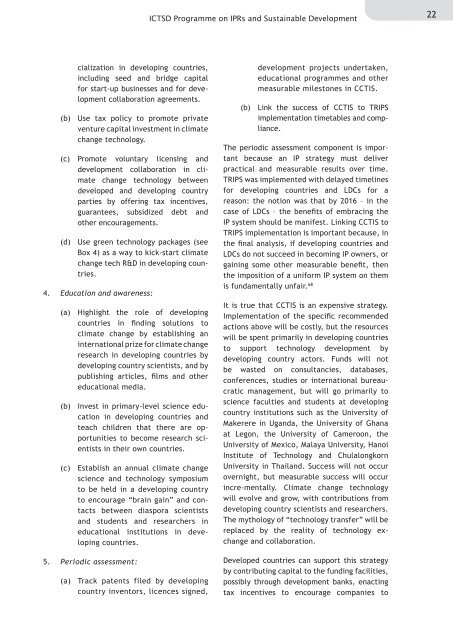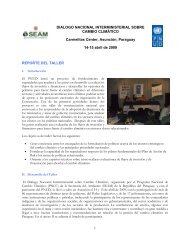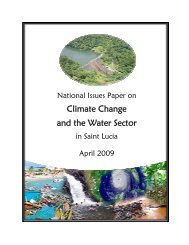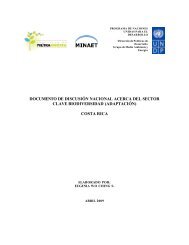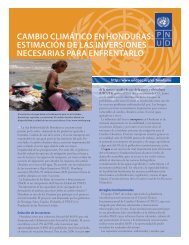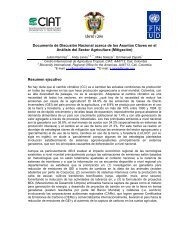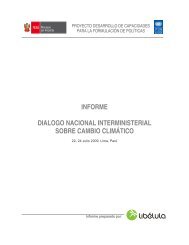View Publication - UNDPCC.org
View Publication - UNDPCC.org
View Publication - UNDPCC.org
You also want an ePaper? Increase the reach of your titles
YUMPU automatically turns print PDFs into web optimized ePapers that Google loves.
ICTSD Programme on IPRs and Sustainable Development<br />
22<br />
cialization in developing countries,<br />
including seed and bridge capital<br />
for start-up businesses and for development<br />
collaboration agreements.<br />
(b) Use tax policy to promote private<br />
venture capital investment in climate<br />
change technology.<br />
(c) Promote voluntary licensing and<br />
development collaboration in climate<br />
change technology between<br />
developed and developing country<br />
parties by offering tax incentives,<br />
guarantees, subsidized debt and<br />
other encouragements.<br />
(d) Use green technology packages (see<br />
Box 4) as a way to kick-start climate<br />
change tech R&D in developing countries.<br />
4. Education and awareness:<br />
(a) Highlight the role of developing<br />
countries in finding solutions to<br />
climate change by establishing an<br />
international prize for climate change<br />
research in developing countries by<br />
developing country scientists, and by<br />
publishing articles, films and other<br />
educational media.<br />
(b) Invest in primary-level science education<br />
in developing countries and<br />
teach children that there are opportunities<br />
to become research scientists<br />
in their own countries.<br />
(c) Establish an annual climate change<br />
science and technology symposium<br />
to be held in a developing country<br />
to encourage “brain gain” and contacts<br />
between diaspora scientists<br />
and students and researchers in<br />
educational institutions in developing<br />
countries.<br />
5. Periodic assessment:<br />
(a) Track patents filed by developing<br />
country inventors, licences signed,<br />
development projects undertaken,<br />
educational programmes and other<br />
measurable milestones in CCTIS.<br />
(b) Link the success of CCTIS to TRIPS<br />
implementation timetables and compliance.<br />
The periodic assessment component is important<br />
because an IP strategy must deliver<br />
practical and measurable results over time.<br />
TRIPS was implemented with delayed timelines<br />
for developing countries and LDCs for a<br />
reason: the notion was that by 2016 – in the<br />
case of LDCs – the benefits of embracing the<br />
IP system should be manifest. Linking CCTIS to<br />
TRIPS implementation is important because, in<br />
the final analysis, if developing countries and<br />
LDCs do not succeed in becoming IP owners, or<br />
gaining some other measurable benefit, then<br />
the imposition of a uniform IP system on them<br />
is fundamentally unfair. 68<br />
It is true that CCTIS is an expensive strategy.<br />
Implementation of the specific recommended<br />
actions above will be costly, but the resources<br />
will be spent primarily in developing countries<br />
to support technology development by<br />
developing country actors. Funds will not<br />
be wasted on consultancies, databases,<br />
conferences, studies or international bureaucratic<br />
management, but will go primarily to<br />
science faculties and students at developing<br />
country institutions such as the University of<br />
Makerere in Uganda, the University of Ghana<br />
at Legon, the University of Cameroon, the<br />
University of Mexico, Malaya University, Hanoi<br />
Institute of Technology and Chulalongkorn<br />
University in Thailand. Success will not occur<br />
overnight, but measurable success will occur<br />
incre-mentally. Climate change technology<br />
will evolve and grow, with contributions from<br />
developing country scientists and researchers.<br />
The mythology of “technology transfer” will be<br />
replaced by the reality of technology exchange<br />
and collaboration.<br />
Developed countries can support this strategy<br />
by contributing capital to the funding facilities,<br />
possibly through development banks, enacting<br />
tax incentives to encourage companies to


